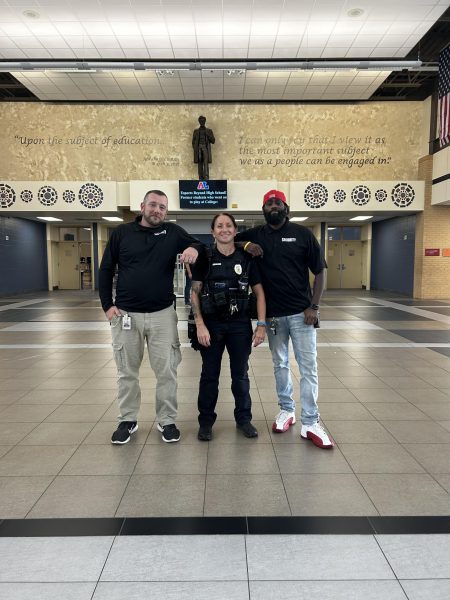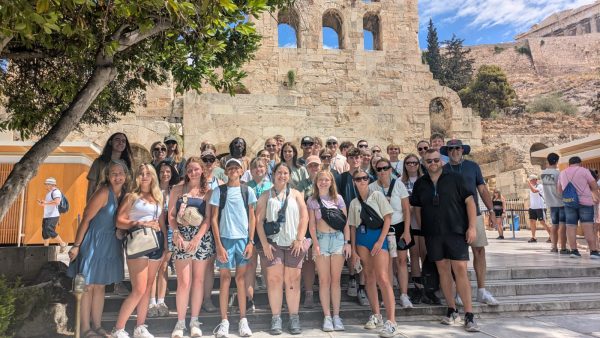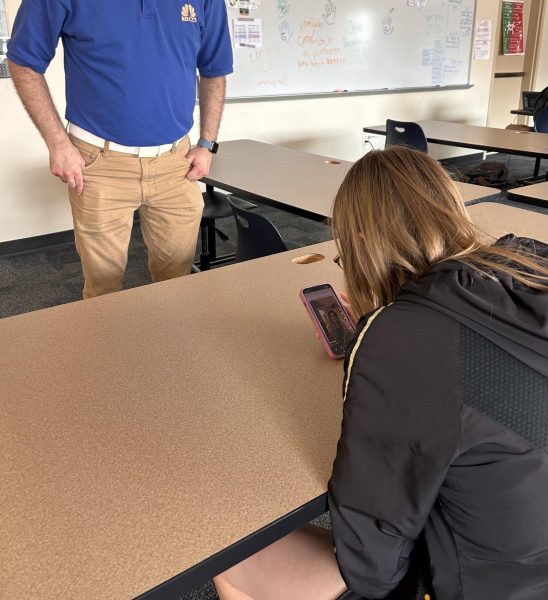ELD students, staff work to overcome obstacles
The Council Bluffs Community School District is filled with many minorities of all kinds. It’s also filled with a lot of students that don’t speak English as their first language. Those students are usually enrolled into the English Learning Department (ELD). The name of the program switched from ESL (English Second Language) to ELD because English isn’t always their second language, many students speak multiple languages. The program has been beneficial for many students but some have experienced times where ELD students have lacked some resources for ELD students and English learning families.
ELD teacher Wendy Punteney has been working in the program at Thomas Jefferson High School for 12 years, but for the past three years she’s split between Abraham Lincoln High School and Thomas Jefferson teaching the newcomers. There are currently two teachers Wendy Punteney, and Laura Flahive.
A class in the ELD program isn’t much different from a mainstream class. Both classes have similar curriculums however multiple languages are spoken throughout the classroom so the goal is to use as much English as they can throughout the day. Punteney explained what an ELD class looks like.
“We focus on building vocabulary, learning grammar rules, reading and writing about literature as well as speaking and listening skills,” Punteney said. “We use a textbook and curriculum with grade level literature that we read and discuss. We also focus on strategies that students can use in their core classes to allow them to be successful.”
Flahive is the English Language Development teacher which is a supplementary class for juniors and seniors. She also teaches 9th and 10th grade English to the English learners which is more one on one learning to enhance their understanding of English. Flahive shares the learning strategies used in the classroom.
“Using pictures, hand-gestures, intense vocabulary instruction throughout content delivery, and immersive conversation in small classroom environments help students gain confidence to take the risk and experiment with their new language,” Flahive said.
Punteney said ELD students have normal teen challenges and on top of that they have to learn a new language.
“They face the same challenges that all teens face on top of that,” Punteney said. “But they do show up and put in the work. They make me want to be better so I can help them learn faster and be successful.”
Junior Iveth Saldńa moved from a Washington State school–with a variety of Spanish speakers– to Abraham Lincoln with fewer Spanish speakers. She has been in the ELD program for eight years. Last semester, according to Saldńa, she was provided with assistance after requesting help.
“Last semester I wasn’t provided with resources and I failed most of my classes and I feel like no one noticed,” Saldńa said. “And Miss Beccah, the Upward Bound coordinator, talked to my counselor. Then I was given a translator for some of my classes, just 1st and 4th.”
Many students have voiced that they’ve had to translate for their family and other students. Senior Rolando Martinez has translated for his family since a young age.
“I have had to translate for my own family at conferences and school functions. I have been translating for my family ever since I learned English; starting around 2nd or 3rd grade. I have translated more times than I can keep track of.”
Martinez has also had to translate for his other classmates in elementary school.
“Specifically, in 5th grade, I remember a student who came in from El Salvador and I had to translate a lot of the school material. Understanding how hard it can be to learn a new language, I wanted to help him. I helped him with translation throughout most of the year. I do recall that there were some material things that I did not know how to translate, so it became challenging.”
Senior Abigail Rodriguez has been in the ESL program since 3rd grade. She has had to translate for her peers in class.
“I am always translating for students and double checking with them if they have any questions or do not understand the work,” Rodriguez said. “I translate for them in classes, work, and even sometimes during conferences.”
ELD students and former students have experienced racism from other classmates in their mainstream classes simply because they don’t speak English. Rolando Martinez is one of those many students.
“I did experience some racist remarks from students who only spoke English,” Martinez said.
Saldańa has also experienced times where other students discriminated for being hispanic.
“In science, we were getting paired up in groups and a student said no to working with me and then told me that she hopes Trump wins to send all hispanics back to their country,” Saldańa said.
ELD students face a lot of obstacles with the language barrier which stunts involvement with extra curricular activities. Flahive says that the students are scared to make mistakes in mainstream classes and feel more safe in the ELD classes.
“Often our EL’s are quiet in their mainstream classes, and that’s because they are often mortified to make mistakes in front of their peers,” Flahive said. “Our classrooms offer a safe place for students to make mistakes, grow, make more mistakes, and grow even more with students who are experiencing the same difficulties with language.”
Abigail Rodriguez thinks the language barrier stops students from getting more involved.
“It’s hard for the students to get involved around the school because the students don’t have the interpreter by their side,” Rodriguez said.
Although the ELD program is beneficial to a lot of students many ELD students and former ELD students would like to see changes in the program. Rolando Martinez would like to see change in the knowledge of the students’ culture.
“I would like the ESL program to understand the diverse cultures better. The program understands language barriers and differences, however, language is very much influenced by the culture from which the student comes from,” Martinez said.
Junior Jasmine Portillo was in the ELD program in 1st through 5th grade. She then passed her tests and tested out. Her junior year she tested again and was placed back into the program. ELD students and former ELD students are tested every year, and if they don’t meet all the requirements they are placed back into the program. The test consists of writing, speaking, reading, and listening. Students must be proficient or higher to remain in mainstream classes. Portillo would like to see changes in the testing criteria for the ELD program.
“What I want to see change is how the way we’re put into the program because I had to take a test last year to see whether or not I needed help and to be proficient I need a 4 or higher. I scored a 3 on one category which wasn’t really a big reason to put me in the program,” Portillo said.
Rodriguez would like to see changes from how the mainstream teachers teach ELD learners. She would also like to see changes in the amount of aid and translators.
“It’s understable that teachers may have a hard time but the students just need more help with the work and in school as well,” Rodriguez said. “I would like to ask the district to actually provide more interperes for the students in the school but like the students just need the help because it is hard for them to feel motivated to come to school.”






